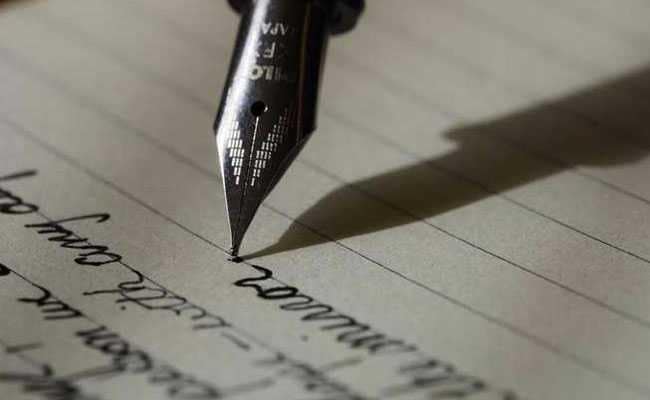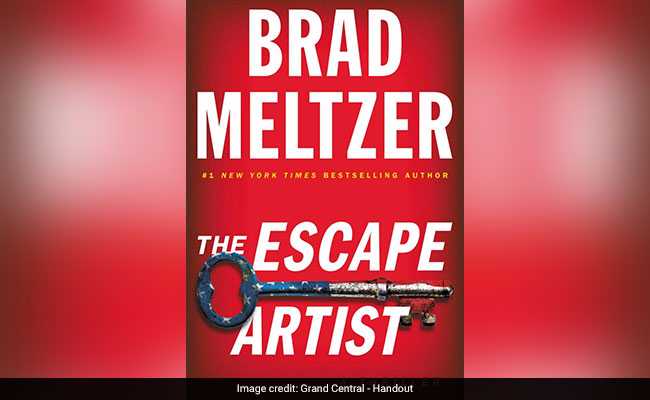
While researching for a book, Brad Meltzer was told about a note that intrigued him. (Representational)
I love finding secrets.
As a thriller writer, I've taken readers into tunnels below the White House and the hidden labyrinth below the U.S. Capitol. But as I was researching my new thriller,
I never thought I'd find anything like this.
The process started over three years ago, when I got a glimpse of what goes on inside Dover Air Force Base, in Delaware, the mortuary for the government's most top-secret and high-profile cases.
On 9/11, the victims of the Pentagon attack were brought there. So were the victims of the attack on the USS Cole, the astronauts from the space shuttle Columbia, and the remains of well over 50,000 soldiers and CIA operatives who fought in Vietnam, Afghanistan, Iraq and every secret location in between.
The people there know details about hidden missions that almost no one in the world will ever hear about. Dover is a place full of more secrets than you can imagine. It's the perfect setting for a mystery. Plus, in today's world, we need heroes. The people here were the real deal. From the moment I stepped inside, I was struck by the care put into ensuring that our fallen soldiers are shown the dignity and respect their remains deserve. It is the one "no-fail mission" in the military. When a soldier's body comes home, morticians can rebuild hands (rather than giving a fake prosthesis) so that a mother can hold her son's hand one final time. They might spend 14 straight hours wiring together a fallen soldier's shattered jaw, then smoothing it over with clay and makeup, just so his parents can have far more ease than they ever should expect at their son's funeral.
From the moment I stepped inside, I was struck by the care put into ensuring that our fallen soldiers are shown the dignity and respect their remains deserve. It is the one "no-fail mission" in the military. When a soldier's body comes home, morticians can rebuild hands (rather than giving a fake prosthesis) so that a mother can hold her son's hand one final time. They might spend 14 straight hours wiring together a fallen soldier's shattered jaw, then smoothing it over with clay and makeup, just so his parents can have far more ease than they ever should expect at their son's funeral.
That alone inspired me to try to create a hero worthy of such respect.
Then, during one of my research visits, a mortician gave me a piece of information that I'll never forget. I was describing the plot of my book, asking whether there's any way a person could leave a hidden message inside his body before he died.
The room went silent. The mortician told me that if you're on a plane that's going down, if you handwrite a note and eat it, the human stomach has enough liquids to protect the note from burning.
"The ultimate message in a bottle," the mortician said. "And it really happened."
"What're you talking about?" I asked. "When?"
"9/11."
Right there, the story came out. On 9/11, the victims of the Pentagon attack were brought to Dover. When the morticians worked on one of the bodies, they found a note inside. Apparently, as the plane was going down, one of the victims on Flight 77 actually ate a note, which was found by a Dover mortician.
To this day, the mortician won't tell me what the note said, and I appreciate the need to respect that privacy. Since the morticians successfully recovered the note, I like to believe it (or at least its message) was delivered to its intended recipient.
For the next three years, I wrote my two new characters: a Dover mortician and a female staff sergeant, who fights for her life like no one I'd ever created. In the opening chapter, a plane falls from the sky as someone scribbles a secret note that will be found by a Dover mortician.
But I still haven't been able to shake that initial story - and the secrets of the real note. I lost a friend on that Pentagon flight. I assumed the note must've been written by someone in the military. Who else would know that the liquid in your belly could preserve a piece of paper? I thought the message contained information about what happened on the plane: where the terrorists were, the weapons they used, how many there were.
Then, I imagined that the note was probably personal, a last regret that needed to be confessed. But the more I thought about it, the more I've come to believe that the note was simply one person seeking what we all desire: connection. We want to be loved - and tell others that we love them.
When my own parents died several years ago, I took comfort in the fact that I was able to say goodbye and tell them I loved them. To this day, on every flight I'm on, when we hit some bumpy turbulence, I think of what I'd scribble in my own note. I'd write to my wife and children, letting them know that they are the very best parts of my existence.
In that, I am oddly filled with hope. It's a hope that comes from a person I will never meet and never know. The final secret message from 9/11 does exactly what it was supposed to do - from the moment it was written down. It became a message that wasn't sent in vain. It became a story that lives on. And it became a symbol of hope that when we reach out and send a message in a bottle, we will be heard.
---
Brad Meltzer is the author of 12 thrillers, as well as the Ordinary People Change the World series. His newest thriller, "The Escape Artist," will be released this week.
(This story has not been edited by NDTV staff and is auto-generated from a syndicated feed.)
As a thriller writer, I've taken readers into tunnels below the White House and the hidden labyrinth below the U.S. Capitol. But as I was researching my new thriller,
I never thought I'd find anything like this.
The process started over three years ago, when I got a glimpse of what goes on inside Dover Air Force Base, in Delaware, the mortuary for the government's most top-secret and high-profile cases.
On 9/11, the victims of the Pentagon attack were brought there. So were the victims of the attack on the USS Cole, the astronauts from the space shuttle Columbia, and the remains of well over 50,000 soldiers and CIA operatives who fought in Vietnam, Afghanistan, Iraq and every secret location in between.
The people there know details about hidden missions that almost no one in the world will ever hear about. Dover is a place full of more secrets than you can imagine. It's the perfect setting for a mystery. Plus, in today's world, we need heroes. The people here were the real deal.

"The Escape Artist," Brad Meltzer's book will be released this week.
That alone inspired me to try to create a hero worthy of such respect.
Then, during one of my research visits, a mortician gave me a piece of information that I'll never forget. I was describing the plot of my book, asking whether there's any way a person could leave a hidden message inside his body before he died.
The room went silent. The mortician told me that if you're on a plane that's going down, if you handwrite a note and eat it, the human stomach has enough liquids to protect the note from burning.
"The ultimate message in a bottle," the mortician said. "And it really happened."
"What're you talking about?" I asked. "When?"
"9/11."
Right there, the story came out. On 9/11, the victims of the Pentagon attack were brought to Dover. When the morticians worked on one of the bodies, they found a note inside. Apparently, as the plane was going down, one of the victims on Flight 77 actually ate a note, which was found by a Dover mortician.
To this day, the mortician won't tell me what the note said, and I appreciate the need to respect that privacy. Since the morticians successfully recovered the note, I like to believe it (or at least its message) was delivered to its intended recipient.
For the next three years, I wrote my two new characters: a Dover mortician and a female staff sergeant, who fights for her life like no one I'd ever created. In the opening chapter, a plane falls from the sky as someone scribbles a secret note that will be found by a Dover mortician.
But I still haven't been able to shake that initial story - and the secrets of the real note. I lost a friend on that Pentagon flight. I assumed the note must've been written by someone in the military. Who else would know that the liquid in your belly could preserve a piece of paper? I thought the message contained information about what happened on the plane: where the terrorists were, the weapons they used, how many there were.
Then, I imagined that the note was probably personal, a last regret that needed to be confessed. But the more I thought about it, the more I've come to believe that the note was simply one person seeking what we all desire: connection. We want to be loved - and tell others that we love them.
When my own parents died several years ago, I took comfort in the fact that I was able to say goodbye and tell them I loved them. To this day, on every flight I'm on, when we hit some bumpy turbulence, I think of what I'd scribble in my own note. I'd write to my wife and children, letting them know that they are the very best parts of my existence.
In that, I am oddly filled with hope. It's a hope that comes from a person I will never meet and never know. The final secret message from 9/11 does exactly what it was supposed to do - from the moment it was written down. It became a message that wasn't sent in vain. It became a story that lives on. And it became a symbol of hope that when we reach out and send a message in a bottle, we will be heard.
---
Brad Meltzer is the author of 12 thrillers, as well as the Ordinary People Change the World series. His newest thriller, "The Escape Artist," will be released this week.
(This story has not been edited by NDTV staff and is auto-generated from a syndicated feed.)
Track Latest News Live on NDTV.com and get news updates from India and around the world

